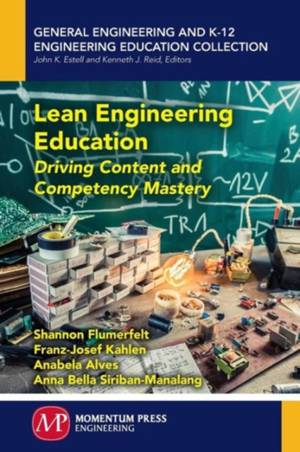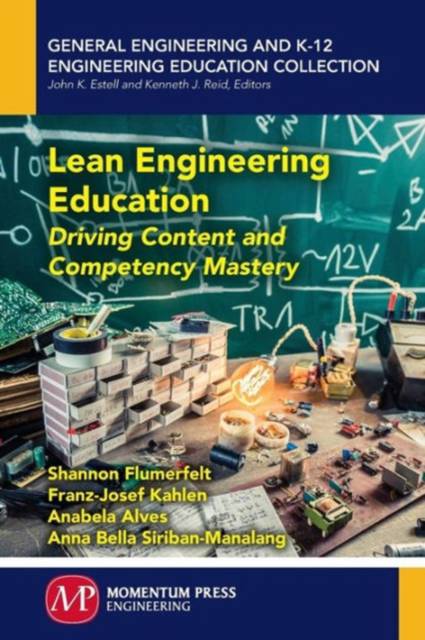
Door een staking bij bpost kan je online bestelling op dit moment iets langer onderweg zijn dan voorzien. Dringend iets nodig? Onze winkels ontvangen jou met open armen!
- Afhalen na 1 uur in een winkel met voorraad
- Gratis thuislevering in België vanaf € 30
- Ruim aanbod met 7 miljoen producten
Door een staking bij bpost kan je online bestelling op dit moment iets langer onderweg zijn dan voorzien. Dringend iets nodig? Onze winkels ontvangen jou met open armen!
- Afhalen na 1 uur in een winkel met voorraad
- Gratis thuislevering in België vanaf € 30
- Ruim aanbod met 7 miljoen producten
Zoeken
Lean Engineering Education
Driving Content and Competency Mastery
Shannon Flumerfelt, Franz-Josef Kahlen
€ 62,95
+ 125 punten
Uitvoering
Omschrijving
Recent studies by professional organizations devoted to engineering education, such as Vision 2030 (ASME) and Vision 2025 (ASCE), highlight the need for the restructuring of engineering education. Deficiencies of many engineering graduates include poor systems thinking and systems analysis skills, lack of sensitivity for sustainability issues, poorly developed problem solving skills and lack of training to work in (multi- disciplinary) teams, as well as a lack of leadership, entrepreneurship, innovation, and project management skills. The book's contents include an analysis of current shortfalls in engineering education and education related to professional practice in engineering. Further, the authors describe desirable improvements as well as advocacy for the use of lean tenets and tools to create a new future for engineering education. This book presents, for the first time, an outside-in lean engineering perspective of how this commonly accepted and widely practiced and adapted engineering perspective can shape the direction in which the engineers of the future are trained and educated. By its very nature, lean engineering demands systems thinking and systems analysis as well as problem solving skills. In this sense, "Lean Engineering" immediately talks to sustainability of operations. Hence, this book adds to the body of knowledge regarding engineering education. It blends the perspectives and expertise of mechanical, industrial and production engineers and academics and the perspective from social sciences on the challenges encountered in engineering education. Because of the unique mix of authors, the book presents a well-rounded perspective of how lean thinking can address shortcomings in engineering education.
Specificaties
Betrokkenen
- Auteur(s):
- Uitgeverij:
Inhoud
- Aantal bladzijden:
- 180
- Taal:
- Engels
- Reeks:
Eigenschappen
- Productcode (EAN):
- 9781606508251
- Verschijningsdatum:
- 9/06/2015
- Uitvoering:
- Paperback
- Formaat:
- Trade paperback (VS)
- Afmetingen:
- 152 mm x 229 mm
- Gewicht:
- 204 g

Alleen bij Standaard Boekhandel
+ 125 punten op je klantenkaart van Standaard Boekhandel
Beoordelingen
We publiceren alleen reviews die voldoen aan de voorwaarden voor reviews. Bekijk onze voorwaarden voor reviews.











